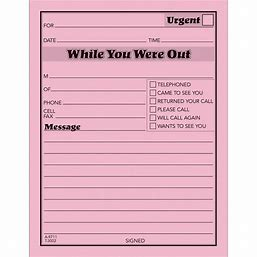Consistent
I didn't sleep well last night. Not uncommon, when one has things on her mind. And when do I not?
Also, the top of my left foot itched, which (I learned from midnight online searches) is a common phenomenon. Not so much the specificity of my own itch, but the fact that we humans are bombarded with sensory stimuli all day and the brain frantically filters out what's less important. So sometimes when all that calms down and you're lying in a darkened room breathing regularly, the brain's like, "Oh yeah, and BTW, your foot's been itching."
Somehow I pictured that scenario as an assistant handing her boss a stack of those pink "While You Were Out" message slips.
Recently, Canadians' sleep habits were in the news--someone released a report--and I caught a news item about it. Toward the end of the item, it listed what constitutes "good sleep," as a way to say "If you don't get this, maybe talk to someone about your sleep habits."
I can't find the report or the news item, but the main thing I retained from the whole discussion was the way the recommendations were written.
It wasn't, "If you are under age 65 and don't sleep 8 hours every night, terrible things will happen." Or even, "To get an A in sleep, you must have between 7 and 9 hours of sleep every night." Either of which could hook me right in.
Instead, the report and recommendations talked about consistency--not perfection. They introduced the concepts of "good enough" and "improvements." For example, "Try to get 7 to 8 hours of sleep 5 to 7 nights a week."
Of course, my black-and-white-thinking, rule-loving self perked up. Part of what I do when I lie awake at night* is fret about lying awake at night. (I'm fun like that.)
Or now I can say, what I *used* to do. Because now I know that 7 to 8 hours of sleep, 5 to 7 nights a week is "good enough." A night in which I sleep 6 hours isn't going to doom me. I can let go of my performance anxiety and just accept that it's a night when I get 6 hours of sleep. (Because I'm me, this is a work in progress, but I can at least try to let go of the worry.)
And speaking of "improvement," I know I don't need to scroll screens at night, no matter what interesting news might be going on. I could channel my perfectionist tendencies to cutting THAT out, vs. fretting about the digits on the clock.
Perhaps most important of all is how the idea of "good enough," to say nothing of "improvement," might apply in other areas of my life.
Is it "good enough" to spend a few minutes with new work, even if I can't manage the hour I'd hoped for? Is it "good enough" to do almost all of my goal treadmill workout after a night of short sleep? Maybe. Maybe not. Maybe I really want to spend evenings sorting receipts and spend more daytime hours (even minutes!) with new work. Maybe I can let 23 minutes on the treadmill be enough, instead of haranguing myself for not pushing through to 30.
The thing is, it's a choice. Maybe I already knew that, but this sleep study was a good reminder.
I'm okay with life being a spiral, and lessons I thought I knew coming back around in new and meaningful ways. Nice to have a life in which I can keep learning.
_______________________________
* Which I've actually written about in "Nulliparous," first published in Pithead Chapel and later in my collection, REVERBERATIONS: A DAUGHTER'S MEDITATIONS ON ALZHEIMER'S.
